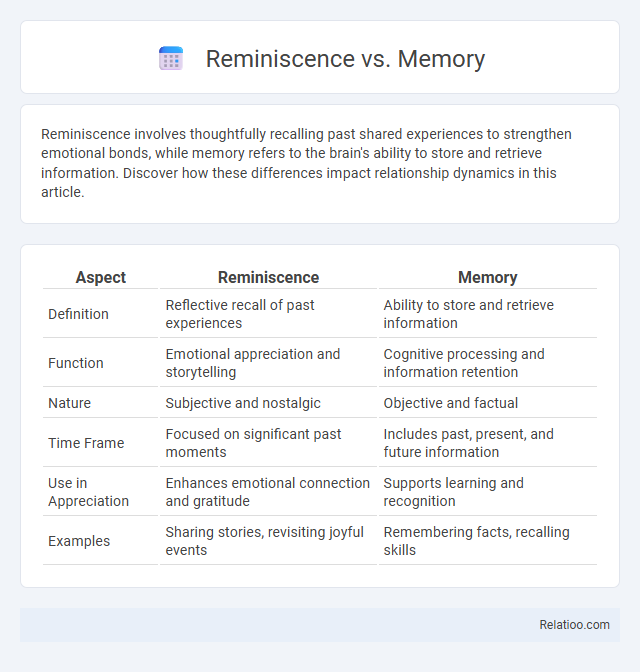Reminiscence involves thoughtfully recalling past shared experiences to strengthen emotional bonds, while memory refers to the brain's ability to store and retrieve information. Discover how these differences impact relationship dynamics in this article.
Table of Comparison
| Aspect | Reminiscence | Memory |
|---|---|---|
| Definition | Reflective recall of past experiences | Ability to store and retrieve information |
| Function | Emotional appreciation and storytelling | Cognitive processing and information retention |
| Nature | Subjective and nostalgic | Objective and factual |
| Time Frame | Focused on significant past moments | Includes past, present, and future information |
| Use in Appreciation | Enhances emotional connection and gratitude | Supports learning and recognition |
| Examples | Sharing stories, revisiting joyful events | Remembering facts, recalling skills |
Introduction to Reminiscence and Memory
Reminiscence and memory both relate to the retention and recall of past experiences but differ in their processes and emphasis. Memory encompasses the cognitive functions involved in encoding, storing, and retrieving information, forming the foundation of human learning and identity. Reminiscence focuses on the reflective recall of past events, often invoking emotional responses and offering therapeutic benefits in contexts such as aging and psychological well-being.
Defining Reminiscence: Purpose and Meaning
Reminiscence involves the intentional act of recalling past experiences to find meaning and reinforce identity, differing from passive memory, which is the automatic storage and retrieval of information. The purpose of reminiscence extends beyond mere recall; it fosters emotional processing, enhances self-understanding, and strengthens social bonds. In cognitive and psychological contexts, reminiscence serves as a reflective tool that supports mental well-being and continuity of the self.
Understanding Memory: Types and Functions
Memory encompasses various types, including sensory, short-term, and long-term memory, each serving distinct functions such as information retention, retrieval, and processing. Reminiscence specifically involves recalling past experiences, often highlighting episodic memory, which is crucial for personal identity and emotional context. Understanding these memory types and their functions enhances cognitive neuroscience insights and supports strategies for memory improvement and mental health interventions.
Key Differences Between Reminiscence and Memory
Reminiscence involves the conscious act of recalling past experiences, often evoking emotions and detailed narratives, whereas memory refers to the overall cognitive process of encoding, storing, and retrieving information without the necessity of emotional engagement. Reminiscence is typically deliberate and reflective, frequently used in contexts like therapy or storytelling to reinforce identity, while memory encompasses both short-term and long-term retention of facts, skills, and events. Key differences include reminiscence's focus on personal, autobiographical events and memory's broader scope, which includes unconscious and procedural information.
The Role of Emotion in Reminiscence vs Memory
Emotion plays a crucial role in both reminiscence and memory, influencing the vividness and accuracy of recalled experiences. Reminiscence often involves emotionally charged reflections on past events, which can enhance the depth of personal significance and emotional connection. In contrast, memory encompasses a broader cognitive process where emotion may either strengthen or distort the recall depending on the context and individual differences.
Cognitive Processes Involved
Reminiscence involves the intentional retrieval and recollection of past experiences, engaging cognitive processes such as episodic memory and self-referential thinking. Memory encompasses the broader mechanism of encoding, storage, and retrieval of information, relying on neural substrates like the hippocampus and prefrontal cortex for both declarative and non-declarative memory types. Unlike simple memory recall, reminiscence often activates emotional and autobiographical networks, making it a complex interaction between cognitive and affective systems.
Reminiscence Therapy and Mental Health Benefits
Reminiscence Therapy involves the intentional recall of past experiences to enhance mental health, differentiating it from general memory as it focuses on emotionally meaningful memories to improve cognitive function and mood. Unlike ordinary reminiscence or memory retrieval, this therapeutic approach leverages positive recollections to reduce anxiety, depression, and loneliness, particularly in older adults and individuals with dementia. Your engagement in Reminiscence Therapy can promote emotional well-being, foster social interaction, and support cognitive resilience over time.
Memory Recall: Accuracy and Distortion
Memory recall involves the retrieval of stored information but is susceptible to both accuracy and distortion due to factors such as suggestion, emotional state, and passage of time. Reminiscence typically emphasizes the recollection of past experiences with a personal or emotional focus, often highlighting meaningful or positive memories, which can lead to selective memory bias. Unlike reminiscence, memory recall research examines the mechanisms underpinning the fidelity of recollected information, revealing how distortions like false memories or reconstructive errors can alter an individual's perception of past events.
Cultural and Social Aspects of Reminiscence
Reminiscence plays a crucial role in cultural preservation by enabling individuals to share collective memories that reinforce social identity and continuity. Unlike memory, which is a personal cognitive function, reminiscence involves storytelling and social interaction that foster community bonds and cultural transmission across generations. The social aspect of reminiscence often occurs in group settings such as family gatherings or cultural rituals, where shared narratives enhance mutual understanding and cultural cohesion.
Conclusion: Integrating Reminiscence and Memory in Daily Life
Integrating reminiscence and memory in daily life enhances emotional well-being by strengthening personal identity and fostering meaningful connections. Your active engagement in recalling past experiences through reminiscence supports cognitive health and reinforces long-term memory retention. Balancing both processes allows for a richer understanding of your life narrative, promoting mental resilience and a positive self-concept.

Infographic: Reminiscence vs Memory
 relatioo.com
relatioo.com